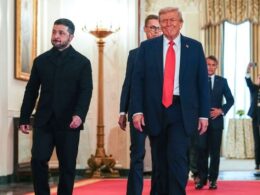This article is an on-site version of our FirstFT newsletter. Subscribers can sign up to our Asia, Europe/Africa or Americas edition to get the newsletter delivered every weekday morning. Explore all of our newsletters here
Good morning and welcome back to FirstFT Asia. In today’s newsletter:
-
Wall Street’s sudden recovery
-
US warns companies globally not to use Huawei AI chips
-
FT investigates Elon Musk’s Doge
The furious rally in US assets sparked by the tariff détente between Washington and Beijing has caught big investors off-guard, colliding with widespread bets against the dollar and Wall Street stocks.
Wall Street rebound: The S&P 500 has rallied 4 per cent this week, erasing all of its losses this year, after the US and China agreed to cut tariffs for at least 90 days, signalling an end to the worst of the trade war. The dollar initially rose too, while US government bond prices have dropped as traders exit traditional havens.
Investors caught ‘offside’: The rush of money back into stocks has stung large asset managers and other institutional investors, who were cautiously positioned on US assets on fears of an economic slowdown and broader worries over US policymaking. “I think the market got caught quite offside,” said Robert Tipp, head of global bonds at PGIM Fixed Income. “As the climbdowns and deals started to look more plausible — even though there are still a lot of tariffs by modern standards — that has forced a reassessment and a major position squaring.”
Too much optimism? In a sign of the dramatic shifts in sentiment, the Nasdaq Composite has surged nearly 30 per cent from a low just weeks ago, after Trump’s April 2 “liberation day” tariff announcement shook markets. But some asset managers warn that this shift towards trade optimism has run too far. “We should remember the policy chaos damage to consumer and business confidence before getting too optimistic,” said Andrew Pease, chief investment strategist at Russell Investments. Read the full story.
Here’s what else we’re keeping tabs on today:
-
Economic data: India, Indonesia and South Korea publish April trade figures, while Australia reports employment figures for the month.
-
Russia-Ukraine talks: The two countries are due to hold peace talks in Turkey.
-
Results: Alibaba and Mizuho Financial Group report earnings.
Join us for a subscriber-only webinar on May 28 for insights into the most consequential geopolitical rivalry of our time: the US-China showdown. Register now and put your questions to our panel.
Five more top stories
1. The Trump administration has taken a tougher stance on Chinese technology advances, warning companies around the world that using AI chips made by Huawei could trigger criminal penalties for violating US export controls. The commerce department issued guidance to clarify that Huawei’s Ascend processors were subject to export controls because they almost certainly contained, or were made with, US technology.
-
Chinese manufacturing: Exporters were “shocked and elated” after China and the US agreed a thaw in their trade war.
-
Hong Kong toymaker plans production shift: VTech plans to move all US-bound production away from China and warned that tariffs meant American consumers would “inevitably” end up paying more for toys.
2. Qatar has agreed to buy up to 210 aircraft from Boeing in what Trump hailed as the largest order of jets in the history of the American company. The White House said economic deals worth more than $243bn had been agreed with Qatar as Trump toured the oil-rich Gulf in pursuit of headline-grabbing investments.
-
Trump meets new Syrian president: The US president urged Ahmed al-Sharaa to normalise ties with Israel, one day after he announced that the US would lift sanctions on the country.
3. Western carmakers may not have a future in China as local brands take significant market share from foreign carmakers like Volkswagen and Toyota, Stellantis has warned. Asked whether western auto groups would be able to compete in China, Maxime Picat, Stellantis’s chief operating officer for Asia-Pacific, Middle East & Africa, said: “I’m quite an optimistic guy, but not on that one.”
4. Tesla’s board has formed a special committee to explore Elon Musk’s pay, which could lead to the electric-vehicle maker’s chief being offered a fresh package of stock options. People familiar with the matter said major investors had given the board their views on the billionaire’s pay and continued leadership of the company.
5. Shares in retail trading platform eToro surged on the company’s Wall Street debut as investor optimism sparked by a de-escalation of trade tensions between China and the US spread to the new listings market. EToro rose as much as 42.8 per cent during intraday trading yesterday, but closed 28.8 per cent higher at $67, valuing it at about $5.5bn.
The Big Read
Six months after Trump officially announced the formation of Elon Musk’s cost-cutting vehicle, the so-called Department of Government Efficiency, it has yet to find a fraction of the $2tn of savings promised at a campaign rally last year. Today’s Big Read has found evidence of inflated valuations to boost numbers and contracts that were due to lapse being claimed as new savings.
We’re also reading . . .
-
Downfall in Davos: Klaus Schwab, the ousted founder of the World Economic Forum, is fighting for his legacy after a whistleblower alleged he and his family received inappropriate financial benefits.
-
Beijing’s aviation ambitions: State-backed manufacturer Comac doesn’t need to dominate abroad to disrupt the global order, writes June Yoon.
-
‘Golden passports’: Christian Kälin, the man behind the rise of citizenship-by-investment schemes, says a landmark EU court ruling won’t stop the trend.
Chart of the day
Moët Hennessy went from generating €1bn in cash in 2019 to burning through €1.5bn last year, according to documents seen by the FT, as a global downturn in sales of alcoholic drinks hit LVMH’s wine and spirits empire hard. But people familiar with its operations say strategic decisions made under the leadership of former CEO Philippe Schaus, who left the group at the start of this year, exacerbated its problems.

Take a break from the news
Jan Dalley, the FT’s former arts editor, picks her favourite pieces of art in the Sigg collection at Hong Kong’s M+ Museum.

Source link









